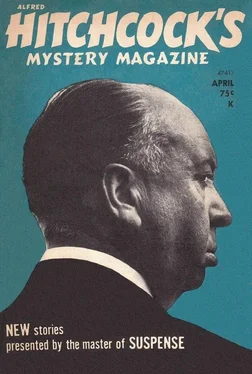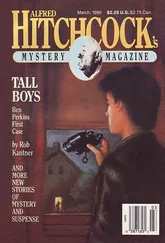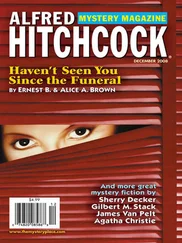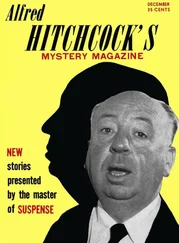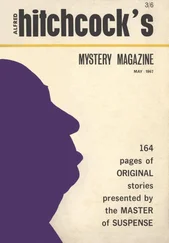Роберт Колби - Alfred Hitchcock’s Mystery Magazine. Vol. 17, No. 4, April 1972
Здесь есть возможность читать онлайн «Роберт Колби - Alfred Hitchcock’s Mystery Magazine. Vol. 17, No. 4, April 1972» весь текст электронной книги совершенно бесплатно (целиком полную версию без сокращений). В некоторых случаях можно слушать аудио, скачать через торрент в формате fb2 и присутствует краткое содержание. Город: Riviera Beach, FL, Год выпуска: 1972, Издательство: H.S.D. Publications, Жанр: Детектив, на английском языке. Описание произведения, (предисловие) а так же отзывы посетителей доступны на портале библиотеки ЛибКат.
- Название:Alfred Hitchcock’s Mystery Magazine. Vol. 17, No. 4, April 1972
- Автор:
- Издательство:H.S.D. Publications
- Жанр:
- Год:1972
- Город:Riviera Beach, FL
- ISBN:нет данных
- Рейтинг книги:5 / 5. Голосов: 1
-
Избранное:Добавить в избранное
- Отзывы:
-
Ваша оценка:
- 100
- 1
- 2
- 3
- 4
- 5
Alfred Hitchcock’s Mystery Magazine. Vol. 17, No. 4, April 1972: краткое содержание, описание и аннотация
Предлагаем к чтению аннотацию, описание, краткое содержание или предисловие (зависит от того, что написал сам автор книги «Alfred Hitchcock’s Mystery Magazine. Vol. 17, No. 4, April 1972»). Если вы не нашли необходимую информацию о книге — напишите в комментариях, мы постараемся отыскать её.
Alfred Hitchcock’s Mystery Magazine. Vol. 17, No. 4, April 1972 — читать онлайн бесплатно полную книгу (весь текст) целиком
Ниже представлен текст книги, разбитый по страницам. Система сохранения места последней прочитанной страницы, позволяет с удобством читать онлайн бесплатно книгу «Alfred Hitchcock’s Mystery Magazine. Vol. 17, No. 4, April 1972», без необходимости каждый раз заново искать на чём Вы остановились. Поставьте закладку, и сможете в любой момент перейти на страницу, на которой закончили чтение.
Интервал:
Закладка:
“I can do better than that, Captain. The kid who chased him is outside now, waiting to make a statement. Want to see him now?”
Neil Quart was not exactly a kid, though he was still on the light side of twenty-five. Leopold had seen the type many times before, on the streets usually, with shaggy hair and dirty clothes, taunting the rest of this world.
“You’re quite a hero,” Leopold told him. “Suppose you tell us how it happened.”
Quart rubbed at his nose, trying to look cool. “I work over at Bambaum’s nights, in the shipping department. I’d just finished there at nine o’clock and was heading home. Down by the Diamond Exchange I saw this guy with the cane smash a window. I wasn’t close enough to grab him, but as he started to run away this cop rounds the corner. The guy hit him with the cane, hard, and knocked him down. Now, I don’t have any love for cops, but I decided to take out after this guy. I ran him down halfway up the block, and we tussled a little. He tried to conk me with the cane too, but I got it away from him. Then he was up and running, but the other cops got there. One cop fired a shot in the air and it was all over.”
Leopold nodded. “How long was the robber — Rudy Hoffman — out of your sight?”
“He wasn’t out of my sight. Not for a second! I went right after him when he knocked the cop down. Hell, I thought he might have killed him.”
“You didn’t see him throw anything away, into the street?”
“Not a thing.”
“Could he have thrown anything away as he raised his hands?”
“I don’t think so.”
Fletcher interrupted at this point. “They caught him at the entrance to an alleyway, Captain. Every inch of it was searched.”
Leopold turned back to Neil Quart. “As you’ve probably guessed, we’re looking for the diamonds he stole. Any idea what he might have done with them?”
The young man shrugged. “Not a glimmer. Unless... We were wrestling around some boxes.”
“They were all checked,” Fletcher said. “Everything was checked. The police were there all night, looking.”
“You still did a good job,” Leopold told the young man. “You weren’t afraid to get involved, and that’s what counts.”
“Thanks. I just didn’t like to see him hit that cop.”
Outside, Fletcher asked, “Satisfied, Captain?”
“Not by a long shot. What about Hoffman’s clothes?”
“We went over every stitch, including his topcoat. Nothing there.”
“All right,” Leopold decided, grim-faced. “Let’s go see where it happened.”
The Midtown Diamond Exchange still showed the scars of the previous night’s robbery, with a boarded-up window and a little pile of broken glass. The assistant manager, who’d been on duty the previous evening, was a sandy-haired man named Peter Arnold who looked pained by the whole affair.
“Just tell us how it was,” Leopold told him. “Everything you can remember.”
“It was just closing time, a few minutes after nine. The other clerk had gone home, and I’d locked the front door. That was when I heard the window smash and saw him scooping up the diamonds.”
“Let’s go back a bit, Mr. Arnold. How many diamonds were in the window?”
“Dozens! We had a few large rings mounted on cards giving the prices, and then we had perhaps twenty-five or thirty smaller stones, unmounted. A melee of diamonds, to use the trade term — although that usually refers to stones of less than a quarter carat. Most of these were larger.”
“They were valued at $58,000?”
Peter Arnold nodded sadly. “I’ve already heard from our New York office about it.”
“Do you always leave that many diamonds in your store window?”
“Not at all. They’re in the window only while the store is open. My first duty after locking the door would have been to remove them from that and the other display windows and lock them in the vault for the night. I had just locked the door and was starting for the window on the other side when I heard the smashing of glass. I looked over and saw this man scooping the diamonds out of their trays. The window alarm was ringing, of course, and as he started away Officer Begler appeared around the corner.”
“You know Phil Begler?”
The jeweler nodded. “He’s been on this beat maybe four or five years. Usually he’s right around this corner, but at nine he goes up to direct traffic out of the parking ramp in the next block. It was only a fluke he happened to get back just when that man broke the window.”
“Any idea what he did with the diamonds during his escape?”
“I’m baffled. If he’d dropped them, I should think at least a few would have been found.”
Leopold walked to the boarded-up window, and pulled aside the black velvet drape so he could peer into it. The diamond trays were still there, speckled with broken glass, but there were no gems. “He got everything?”
“No, there were four rings on cards and six unmounted stones that he missed, but he made a good haul. We estimate $58,000, or even a bit more.”
Leopold let the drape drop back into place. He took out a picture of Rudy Hoffman. “Ever see him in the store before the robbery, casing the place?”
“I don’t remember him, but of course someone else may have been on duty.”
“I’ll leave this picture with you. Show it to your manager and the clerks. See if anyone remembers him.”
“You think it was well-planned?”
“He got rid of the diamonds somewhere, and that took planning.”
On the way out, Leopold paused at the little pile of broken glass and bent to examine it.
“Find something, Captain?” Fletcher asked.
“Ever think about how much broken glass and diamonds look alike, Fletcher?”
“Are there any diamonds in that pile?”
“No, just broken glass.”
On the way back downtown, Fletcher said, “They did an X-ray on Hoffman too, in case you’re thinking he might have swallowed them.”
“Never considered it for a moment.” He stared through the car’s dirty windshield at the passing scene. Police headquarters was separated from the main Union Street shopping area by some ten blocks of abandoned, run-down buildings — many of them doomed by a much-postponed urban renewal project. Those that still had tenants housed record shops and adult bookstores on their lower levels, renting the rooms above to bearded young people and transient types. It was a shabby section of the inner city, but the crime rate was not as high as might be expected.
“They should tear it all down,” Fletcher commented.
“I suppose they will, one of these days.” Leopold had another thought. “What about the men who searched the street? Could one of them have pocketed the diamonds?”
Fletcher thought about it. “We’ve got some bad eggs in the department, Captain — like any other city — but I’d trust any of the men who were out there last night. I know them all, from Begler on down. They’re honest cops.”
Leopold said no more until they reached his office. Then he asked Fletcher to bring him Rudy Hoffman’s clothing. They went over each piece together, though the clothes had been searched earlier, and they found nothing.
Leopold frowned and went to stare out the window at the crowded parking lot that was his only view. “How about a wig, false teeth, something like that?”
Fletcher shook his head. “Nothing, Captain.”
Leopold turned suddenly. “Damn it, Fletcher, why didn’t I think of it before? There’s one thing we’ve completely overlooked, one thing that’s missing from Hoffman’s possessions!”
Fletcher looked blank. “What’s that, Captain?”
“The cane, of course! The silver-headed cane he used to break the window and crack Phil Begler’s skull! Where is it?”
Читать дальшеИнтервал:
Закладка:
Похожие книги на «Alfred Hitchcock’s Mystery Magazine. Vol. 17, No. 4, April 1972»
Представляем Вашему вниманию похожие книги на «Alfred Hitchcock’s Mystery Magazine. Vol. 17, No. 4, April 1972» списком для выбора. Мы отобрали схожую по названию и смыслу литературу в надежде предоставить читателям больше вариантов отыскать новые, интересные, ещё непрочитанные произведения.
Обсуждение, отзывы о книге «Alfred Hitchcock’s Mystery Magazine. Vol. 17, No. 4, April 1972» и просто собственные мнения читателей. Оставьте ваши комментарии, напишите, что Вы думаете о произведении, его смысле или главных героях. Укажите что конкретно понравилось, а что нет, и почему Вы так считаете.
